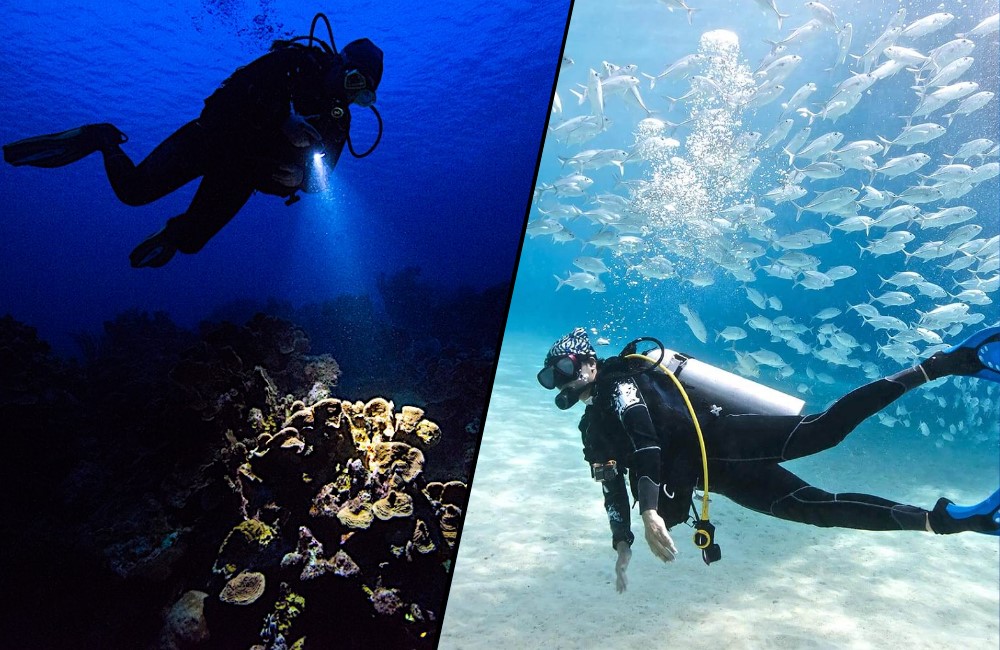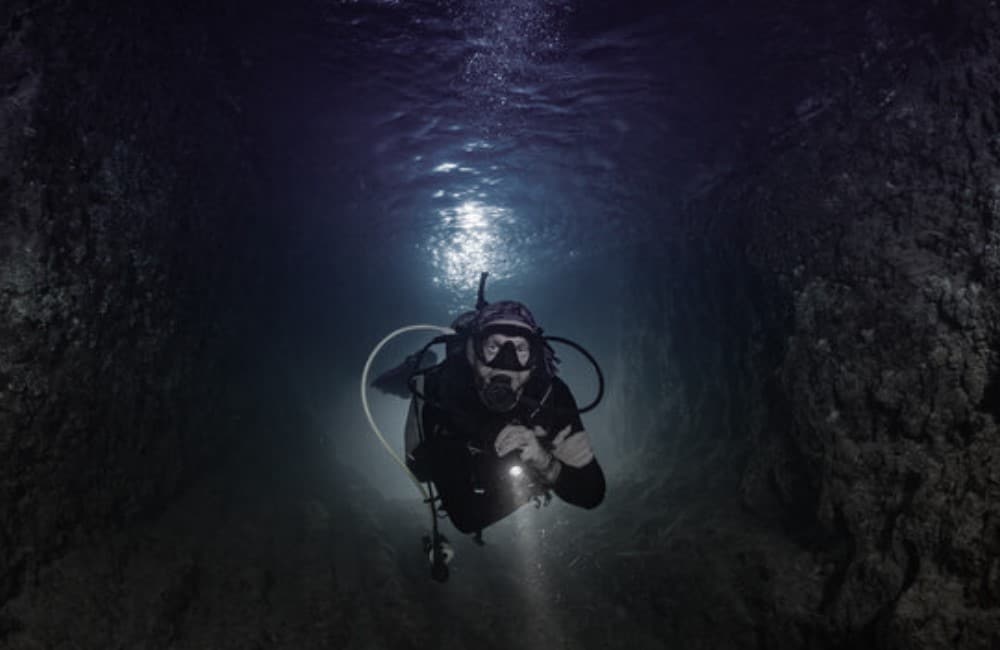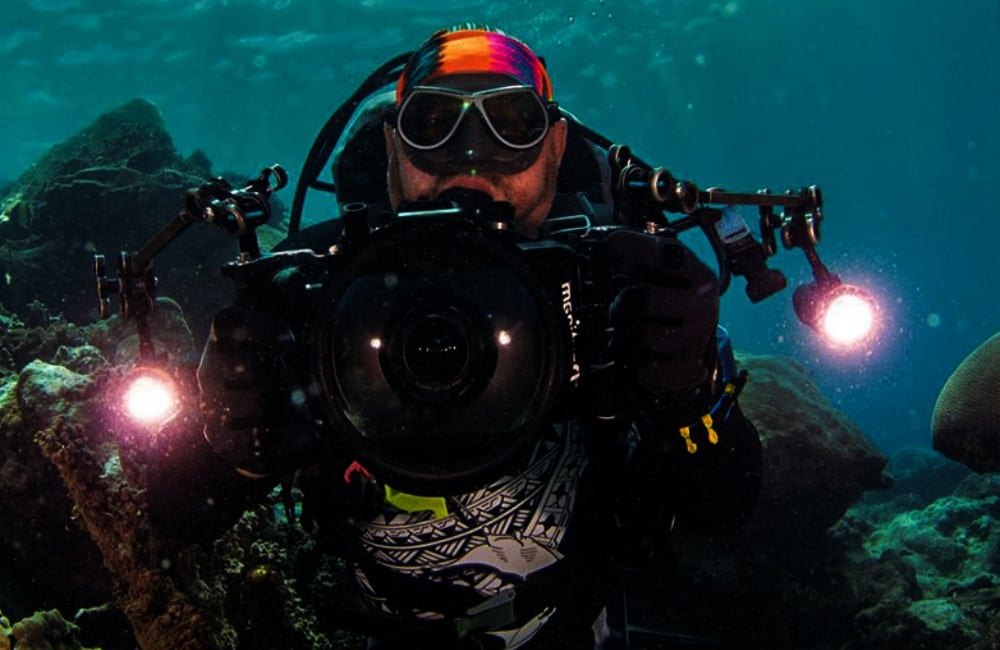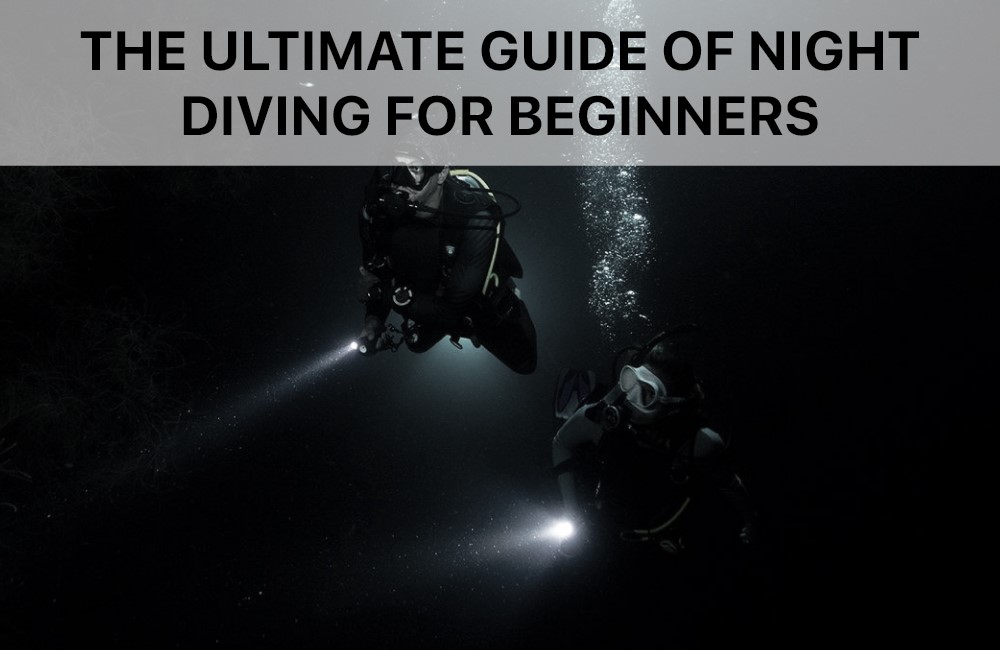Blog
The Ultimate Guide of Night Diving for Beginners
Scuba diving at night is a very different experience than scuba diving during the day. For starters, visibility is significantly reduced, so divers must be more cautious and take care to avoid potential hazards.
What’s the difference between night diving and day diving

Scuba diving at night and during the day varies significantly. Additionally, generally shy or nocturnal creatures are often more active at night, making for a richer diving experience. Another benefit of night diving is that it can be a great way to focus on photography or videography.
Tips for Night Diving

Scuba diving at night is a very different experience than scuba diving during the day. Visibility is significantly reduced, and there is a sense of isolation that can be both exhilarating and disorienting.
Here we share some essential tips for Scuba diving at night. Read on and get to know all there is about this unique and challenging activity:
1. Always night dive with a dive torch
When scuba diving at night, it is essential to use a dive torch. A dive torch is a powerful underwater flashlight that lets you see clearly in the dark. It also provides light for your buddy so that they can see you. Night diving is very different from diving during the day. The lack of sunlight means you must rely on your dive torch to navigate and take notice of your surroundings. Additionally, scuba diving at night can be more challenging as it can be disorienting and difficult to see what is around you.
2. Clip your torch to your equipment or use a wrist strap on a night dive
One of the most important safety considerations for scuba diving at night is ensuring that you have a light source. Whether using a dive torch or a wrist strap light, you must clip it to your equipment to find it if you need it quickly. If you are carrying your light in your hand, there is a risk that you could drop it or lose it in the darkness. By clipping it to your equipment, you can be sure it will be within easy reach if needed. In addition, some dive torches also have a strobe function that can be used to signal for help if needed.
3. Carry a backup torch on your night dives
Having a backup torch is essential for any dive guide. There are plenty of night dives where you will be given one, but if not, it’s essential to have your own so that no faulty batteries or struggles with the object underwater leave you in darkness! It might seem like an extra burden on top during every trip – mainly since most boat trips include both daytime hours as well as nighttime ones. However, when considering all factors involved (the safety concerns associated), this small investment may end up being one worth making
4. Dive torch seal care
Divers know that having a dive torch is key to exploring the underwater world safely. But many divers need to realize that dive torch care is just as important as using one. Always rinse your dive torch in fresh water after each dive to remove salt deposits. You can also soak it in a warm water bath. Never use a cleaning agent – fresh water is all you need.
It’s also essential to inspect the O-rings for any damage and wipe off any excess grease. If you see any damage, replace the O-ring immediately. If not, lightly grease the O-ring and put it back in place.
5. Add a diver safety strobe light to your night diving scuba equipment
A safety strobe light is an excellent addition to your safety equipment and scuba diving gear. If, in any case, your dive lights stop working, the backup strobe light can compensate and make you visible underwater and during your ascend. If you use a dive torch and a safety strobe light during your night dive, switch off the dive torch when you Ascend so that you don’t blind other divers who are ascending with you.
6. Be careful of the coral reef on a night dive
When scuba diving, it is essential to remember that you are visiting an underwater world that is teeming with life. Coral reefs are especially delicate ecosystems, and scuba divers need to be aware of the potential damage they could cause simply by touching the reef or its inhabitants. Touching corals can disturb their delicate balance and harm the overall health of the reef. In addition, many marine animals are threatened by humans, and their touch can be perceived as a threat.
7. Stay in sight of your dive buddy
As the darkness sets in, your peripheral vision will decrease along with depth perception making it essential to stick close but not too far from those around the swimmer’s circle during this time; make sure they are within 3 meters of each other (or 10 feet), though plenty spacious for safety reasons- avoid pointing lights directly into anyone’s eyes! If going without a guide service, follow your dive buddy’s leads. All in all, the rule is always to maintain sight of your dive buddy or guide.
8. Turn your torch off to see the night diving bioluminescence
scuba diving at night is an amazing experience. One of the best things about it is seeing the bioluminescence in the depths of the sea. Try turning your dive torch or light off for a while to get the full effect. You’ll be amazed at how bright the bioluminescence is and how much it lights up the sea around you. It’s an unforgettable experience that everyone should try at least once. You might even see some creatures you wouldn’t usually see during the day.
9. Night dive signals
When scuba diving at night, it is crucial to use signals to communicate with your dive buddy. There are a few different signals that are commonly used for night dives. One such signal is that when the light beam is pointed up, it means “I am going up.” This signals to the other diver that you are ascending. Another standard signal is shining the light beam on the ground to signal that you have found something interesting. Finally, shining the light in your face or pointing it at your dive buddy’s face signifies distress and signals that you need help.
10. Night diving light signals
The lack of sunlight means you rely on your dive lights to see and be seen. Dive lights are also essential for communication, as they can be used to illuminate standard diver hand signals. However, when using a dive light, it is essential to avoid shining it directly into another diver’s face. This can be distracting and make it difficult to communicate.
11. Don’t shine your dive light on your buddy’s face
One of the most important scuba diving etiquette rules is never to shine your dive light in your buddy’s face when scuba diving at night. Not only is it impolite, but it can also be dangerous. If your buddy is using their dive light to navigate, then shining your light in their face will disrupt their vision and could cause them to lose their way.
12. Know the dive site
Knowing what you’re getting into is crucial before you take the plunge at night into the deep sea. Make sure you research the dive site thoroughly beforehand so that you’re familiar with the layout and what sea creatures you might encounter. It’s also a good idea to dive into the site during the day to get a feel for it in daylight.
13. Shore night dive
Taking extra safety precautions when diving in unfamiliar waters is essential. For example, if you’re doing a shore dive instead of a boat dive, ensure you’ve marked the beach where you entered the water. This will help you find your way back if you become disoriented during the dive. You can use chemical lights, lanterns, or flares to mark the beach. Once you’re in the water, it’s also a good idea to stay close to the shoreline so you can orient yourself using natural landmarks.
14. Don’t do a drift night dive
Scuba diving at night can be hazardous if a scuba diver is not careful. One of the biggest dangers of scuba diving at night is getting lost in the darkness. Even during the day, it can be easy for scuba divers to get swept away by currents. In 2007, four scuba divers were lost when they dived on a reef in a drift during the day. If scuba divers go to night dive, they must take extra precautions to ensure their safety or risk getting swept away by a current.
15. Head out for your night dive at dusk
When scuba diving at night, it’s beneficial to head out at twilight or before dusk. That way, you’ll be able to put on your scuba gear in the fading light of the day. Also, if you don’t have extensive scuba diving experience, descending when there’s still some daylight may make the dive less complicated. Another advantage of diving at twilight is observing the change in activity between the daytime marine life and the nocturnal sea creatures. So, if you’re looking to experience something new on your next scuba diving adventure, consider heading out at twilight for a night scuba dive.
16. Take things slowly on a night dive
Most scuba divers have experienced the rush of diving during the daytime when the sun is shining, and the underwater world is alive with color. But there is a very different diving to be had at night. On a night dive, everything is slowed down, and you’ll only cover a small area, but that’s okay because the point is to get to see what’s hidden in the reef or the underwater wreck you intend to explore.
17. Don’t shine your dive light directly into the creature’s eyes
Scuba diving at night allows you to see creatures typically unseen during a dive in the daytime. However, it’s important to be respectful of these animals and their environment since they’re home! Always shine your light on one side to not overwhelm them or guide yourself by its beam rather than shining directly into fish’s eyes.
18. Getting separated on a night dive
In an emergency, getting separated from your dive buddy is possible. If this happens and you are not successful in finding them after 360 degrees of scanning the surrounding area for any telltale signs (such as their bubbles), then the next check would be switching off your torch so that you are more visible during low visibility conditions; however, if there’s no chance at all when using torches due solely because light doesn’t travel far enough through water without getting scattered which makes seeing ahead tricky.
19. Be prepared to see different things and stay calm and relaxed
The lack of sunlight means many smaller creatures hide out while we’re active, but there may still be some interesting visitors surprising you! Use your flashlights with care underwater because too much illumination could upset both wildlife AND human viewers alike – just remember, not all sharks associate humans with food sources (so don’t worry if one swims past).
20. Look out into the black on a night dive
You might be tempted to only look up at your surroundings when diving in the dark, but it’s important not just focus on what is directly before you. Shining a light out into space can help spot potential hazards like sharks that could otherwise go unnoticed and appreciate how eerie beauty the underwater world looks!
21. Additional training and certification for a night dive
Night diving is a fantastic experience but requires special skills and knowledge. The lack of sunlight means you can’t see as well underwater, which poses an additional challenge for those who are scuba- Diving at night requires more than just wearing dive skins; there’s also the matter
To get started with enjoying this new hobby without any major disappointments or accidents waiting around every corner, people should ensure they’re properly trained before trying their hand.
22. Dive with an experienced diver if it’s your first-night dive
The dark underwater environment is a challenge for new divers. If you plan on doing some night diving, ensure that your experienced dive partner has been there before and knows how to get around in the deep waters.
23. Carry a sound signaling device
It is also advisable to ensure that both your scuba gear includes a good dive light and sound signals devices like a whistle or Blast Phone. These will help keep you safe by informing your dive master or the boat that will get you to shore.
How to Use Light to Enhance Night Diving

With the help of a dive torch, you can enhance your visibility and see things that you may not be able to see during the day. While night diving can be safe and enjoyable, there are a few things to keep in mind to make the most of your experience.
First, it is important to use a dive torch with a wide beam to maximize your visibility. Second, keep your dive torch pointed downward, so you do not startle any fish or other marine life. And finally, take some time before your dive to orient yourself with your surroundings so that you can find your way back if needed.
FAQ:
1. Are night dives scary?
For scuba divers, night diving should be treated no differently than a walk outside in the dark. Many divers get scared at descending into dark waters with only a beam of light, but there is no need to be scared. When scuba diving at night, always keep your dive light in front of you and look around for scuba creatures. You may even see marine life you’ve never seen before.
2. Can open-water divers do night dives?
Most open-water divers have at least one night dive on their bucket list. And why wouldn’t they? Night diving opens up a new world of underwater exploration, where creatures come out to play, and the visibility is often better than during the day. But before you take the plunge, getting some night diving training from a qualified instructor is important.
3. Can you see underwater at night?
Simply put, it is not easy to see underwater, particularly at night. Therefore, it’s essential to be aware of the challenges that reduced visibility can bring. In addition, without natural light to guide the way, scuba divers must rely on artificial light sources to navigate the underwater environment. As a result, scuba divers need to be extra cautious when exploring underwater at night.
